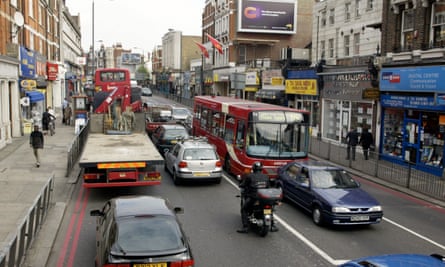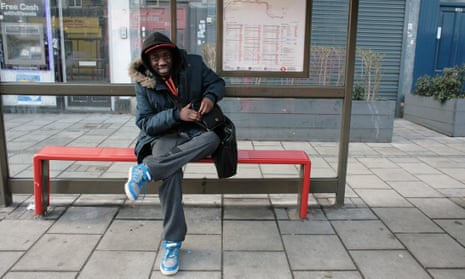Until late last year, René Lukebana Mansitu was taken by taxi to and from college. His autism and mild learning disability were judged too problematic to allow him to make his own way. Now, the 18-year-old happily walks to a station, catches a train and then changes to a bus to get to his performing arts course. He’s never been late.
René is a “travel training” success story: giving older children and young people with support needs the confidence to use public transport. It is an important step in preparing them for independent adult life, but it can also mean a significant saving for cash-strapped councils facing escalating bills for home-to-school transport.
In England, alone, councils are spending £1bn a year on taxis, minibuses and other travel arrangements to get children to and from school or college. Hampshire admits that, at £32m, it spends more on such travel than it does on children’s social workers.
Alison Michalska, the president of the Association of Directors of Children’s Services, says: “Any other large county council has the same story to tell. That’s a hell of a lot of money tied up potentially in the wrong place within the system.” The ADCS wants a government review of council responsibilities for school transport, which it describes as unsustainable. It particularly wants changes to rules that require councils to provide or fund transport for children who have no support needs but live more than two or three miles, depending on age, from the nearest state-maintained school.
Until there is such a review – and the Department for Education is understood to have no plans for one – councils will be left to contain costs as best they can. But an ADCS survey found that 64% of spending on school transport in 2015-16 went on children with special educational needs and disabilities (Send), rising to 98% in London. The survey estimated total spending that year at £969,000 and found that the numbers of Send children were growing.
Do all Send pupils need escorted transport, though? Dai Powell, the chief executive of HCT Group, a transport social enterprise with a turnover of £50m, says that up to a quarter of the children and young people his drivers ferry to and from school do not – or, at least, would not, given the skills and confidence to use public transport.
“We have been transporting disabled kids for 25 years, and we’ve come to realise that a lot of them don’t need it,” says Powell. “We thought, we must be able to do something about that. The [local] authorities are very keen on the savings, of course, but it’s the improved life chances for the kids that are the bigger outcome.”
HCT is offering travel training for children and young people such as René. Several disability and children’s charities run similar initiatives, but HCT stands out because the service appears contrary to its core commercial interest, as a transport provider, and because it is taking the idea to a new level by raising investment for large-scale training through social impact bonds (Sibs).
In René’s council district of Lambeth, south London, HCT is working to offer travel training to up to 200 children aged over 11, which could make savings on their future costs of £3.5m. In Norfolk, where HCT began offering the training earlier this month, it is aiming to get more than 400 children on to public transport, saving the council as much as £6.3m.
Under this approach, councils pay nothing unless the training is successful. Through Sibs, which are a variant of such payment-by-results contracts, HCT is able to spread the cost and risk by offering social investors a share in the success. HCT’s investor is Bridges Fund Management, which has put £480,000 into the Lambeth scheme and is also funding Norfolk and a third project in Surrey.
HCT has secured further backing from the Big Lottery Fund, which put £101,000 into development costs and £1.1m into the three projects, including £197,000 into Lambeth.
René is one of 17 travel-training graduates in Lambeth. After he asked to be considered for the scheme, he was assessed and then assigned a travel trainer, who worked with him on issues such as road safety, adverse weather and stranger awareness, while they travelled together along the route from his family home in Brixton to Lewisham Southwark College, in the neighbouring borough of Lewisham. The journey takes up to an hour.
Over a period of weeks – the average is six to eight – the trainer gradually disengaged from René until he was making the whole journey alone. After sign-off, spot checks are made at three, six and 12 months.

Lara Conner, a co-manager of HCT’s Lambeth project, says an alternative route is always taught in case of disruption. Indeed, René sometimes chooses to take buses right through to college instead of catching a train part-way.
In south London, young people are tutored to avoid contact with gangs. So the travel training might include being accosted by another HCT worker, not known to the trainee, who demands they hand over their money or phone. “It’s about striking a balance,” says Conner. “You don’t want to cause alarm, but young people are vulnerable and you don’t want to wrap them up in cotton wool all their lives.”
Louise Kitenga-Makadi, René’s mother, admits she was worried about letting him travel on his own. “I was frightened because he can get upset when he sees people arguing, and people do carry knives in this area,” she says. “But he always lets me know as soon as he arrives wherever he is going.”
Being able to travel independently means René can now stay late at college for clubs and activities. He also takes himself to church, youth and music groups in other parts of south London during the week and at weekends. He is learning to play the guitar and looks forward to having his own flat, getting married and having a family.
“I don’t feel nervous at all – well, sometimes a bit. But I feel positive about things,” says René.
Amanda Anderson, HCT’s director of independent travel, believes the training has long-term benefits. “About 30% of people with disabilities find transport a barrier to employment, and a similar proportion don’t leave the house at the weekend because they have no transport,” she says. “If you can do this at René’s age, or at 12-14, which is probably the key age for travel training, you can make a real impact.”
Jane Edbrooke, Lambeth’s cabinet member for children and schools, says: “Reducing people’s reliance on specialist door-to-door transport does save money, but the longer-term benefits for the community, such as better inclusion, preparing young people for independent adulthood and encouraging healthy lifestyles, support this council’s priority outcomes for the borough.”
One of Powell’s prized possessions is a letter he received from the mother of a travel-trained young person in Leeds, where HCT piloted its initiative. Her formerly isolated and lonely son had just come home reeking of cigarettes. She was delighted.

Comments (…)
Sign in or create your Guardian account to join the discussion